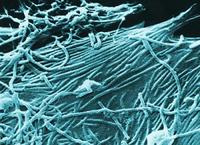-
U.S. faces new wave of invasive species

New study warns that the earlier onset of spring, warmer winters, economic globalization, and increased trade with emerging economies in Asia and Africa will see the United States face a significant new wave of invasive plant introductions; at least forty-two emerging U.S. trade partners – among them Thailand, Egypt, Saudi Arabia, Ecuador, Argentina, and several in equatorial Africa — are poised to export new nursery plant varieties to the United States
-
-
Budget cuts hamper U.S. response to biological attack
A recently released report charges that state and federal budget cuts have weakened U.S. bioterrorism response capabilities
-
-
Georgia readies portable hospitals
On Monday local health and emergency response officials from Georgia’s West Central Health District gathered to learn how to quickly set up a portable hospital in the event of an emergency
-
-
Creating drought-tolerance in crops
Researchers’ discovery creates new blueprint for engineering drought tolerant crops; the researchers found a way to rewire this cellular machinery to heighten the plants’ stress response — a finding that can be used to engineer crops to give them a better shot at surviving and displaying increased yield under drought conditions
-
-
Thai health officials prevent outbreaks in historic floods
Thanks to Thailand’s aggressive public health and emergency response operations, the country managed successfully to prevent disease outbreaks following record floods
-
-
Key to disaster preparedness is “training, training, training”

Bonnie S. Michelman, CPP/CHPA, the director of police, security, and outside services at Massachusetts General Hospital, recently took the time to speak with Homeland Security NewsWire’s executive editor Eugene K. Chow; in their interview, Michelman highlights the recent technological security measures Massachusetts General has installed, finding the right balance between security and openness, and preventing terrorists from stealing the low-grade radioactive materials that are housed in hospitals
-
-
Innovative molecular detection system spots foodborne pathogens
3M introduced the 3M Molecular Detection System, a method of detecting dangerous pathogens like Salmonella, E. coli O157, and Listeria, that can shut down businesses and threaten public health
-
-
Satellites helping to track disease outbreaks
Using satellite images of city lights at night, Princeton researchers have developed a new method to track infectious disease outbreaks
-
-
High-tech cleanser kills superbugs dead
According to the World Health Organization (WHO), antibiotic-resistant bacteria are one of the top three threats to human health; patients in hospitals are especially at risk, with almost 100,000 deaths due to infection every year in the United States alone; engineers develop an easy-to-use solution to make hospitals safer
-
-
New Ebola vaccine protects mice
An experimental vaccine against deadly Ebola hemorrhagic fever protected more than 80 percent of mice given a lethal dose of the virus, and may protect humans as well. Unlike previous experimental vaccines, the new vaccine, which is grown in tobacco plants, is also stable enough to stockpile in case of bioterrorism.
-
-
New wireless sensor quickly detects E. coli in water samples
Fecal contamination of public beaches caused by sewage overflow is both dangerous for swimmers and costly for state and local economies; current methods to detect E.coli, a bacterium highly indicative of the presence of fecal matter in water, typically require 24-48 hours to produce a result; new detection method cuts this time to 1-8 hours
-
-
MSU lands USDA grants totaling nearly $3 million to improve food safety
Three Michigan State University researchers landed grants totaling nearly $3 million from the U.S. Department of Agriculture (USDA) to improve food safety; the three professors are part of the recently created MSU Food Safety Group; this team comprises about thirty MSU researchers from more than ten departments working with other universities around the world to improve food safety
-
-
Progress made toward a vaccine for Ebola

Ebola is one of the most lethal, naturally occurring pathogens on earth, killing up to 90 percent of its victims, and producing a terrifying constellation of symptoms known as hemorrhagic fever; scientists have now made significant progress toward a vaccine against the deadly virus – and this Ebola vaccine could be stockpiled for use in the United States, should the country fall victim to a natural outbreak or a bioterrorism event in which a weaponized strain of the virus were unleashed on soldiers or the public
-
-
How the bioweapon ricin kills
Ricin is one of the deadliest plant based poisons in the world, and what makes it especially dangerous is that it comes from the humble castor oil bean and is available in many health food shops or online; scientists discover the protein that controls how ricin kills
-
-
Safe farm practices initiative launched
Ever since 2006, when a deadly batch of spinach killed three people and sickened hundreds, U.S. farm producers, packers, and others along the distribution line have argued over how best to protect consumers and assure them that leafy greens and tomatoes are safe; now, a major initiative aims to settle these arguments
-
More headlines
The long view
Ransomware Attacks: Death Threats, Endangered Patients and Millions of Dollars in Damages
A ransomware attack on Change Healthcare, a company that processes 15 billion health care transactions annually and deals with 1 in 3 patient records in the United States, is continuing to cause massive disruptions nearly three weeks later. The incident, which started on February 21, has been called the “most significant cyberattack on the U.S. health care system” by the American Hospital Association. It is just the latest example of an increasing trend.
